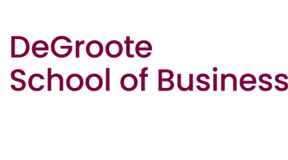Investing in a Blended Learning Part-Time MBA for your employees
The main thing that attracted me to DeGroote’s BLPT Program was the fact that I didn’t need to put my career on hold while pursuing my studies. When considering other programs, I found options to be very limited if I wanted to continue working while completing an MBA.
Why Sponsor?
Sponsoring an employee to complete their MBA through DeGroote’s Blended Learning Part-Time (BLPT) program is not just an investment in them – it is an investment in your organization, with both immediate and long-term returns.
Immediate Value
Your employee is exposed to various disciplines, including accounting, strategy, marketing and finance, all of which improve their agility to tackle and understand problems affecting your business. Courses are adapted for professionals and students, with a focus on practical learning and case studies. In addition to hands-on learning, a strong focus on collaboration encourages students to engage with their peers to develop an interdisciplinary perspective that they can begin to apply to your organization immediately.
Long-term results
Supporting your high-potential employee while they complete their MBA is an opportunity to develop the next generation of leaders who will be responsible for the continued success and growth of your
organization. Through a three-year part-time curriculum, the BLPT program delivers on its commitment to take potential and shape it into students who emerge as agile leaders. This is accomplished through collaborative experiences, exposure to fundamental knowledge of key business areas and an innovative growth mindset.
Who is the ideal candidate for DeGroote’s BLPT MBA
We look for students who are self-motivated working professionals with strong leadership potential, exceptional collaboration skills and the drive to excel academically. On average, our students have eight years of professional work experience from a broad range of industries. One of our program’s key strengths is in the diverse professional and academic backgrounds of our class – mirroring the structure of a professional work environment – our students collaborate, share ideas, and reap the rewards of a cohort diverse in backgrounds, skills and thoughts. The BLPT MBA is a competitive-entry program, with a
program capacity of approximately 60 students each September.
The BLPT MBA is delivered over three years of continuous part-time study (nine terms total). Students complete the equivalent of two full-credit courses per term. View the detailed schedule here.
Frequently asked Questions
We look for students who are self-motivated working professionals with strong leadership potential, exceptional
collaboration skills and the drive to excel academically. On average, our students have eight years of professional work experience from a broad range of industries.
One of our program’s key strengths is in the diverse professional and academic backgrounds of our class –
mirroring the structure of a professional work environment – our students collaborate, share ideas, and reap the rewards of a cohort diverse in backgrounds, skills and thoughts.
The BLPT MBA is a competitive-entry program, with a program capacity of approximately 60 students each September
The BLPT MBA is delivered over three years of continuous part-time study (nine terms total). Students complete the equivalent of two full-credit courses per term. Here is a sample of several courses.
Year 1: Management Fundamentals, Economics & Business Statistics, and Competing Through Digital Transformation & Analytics
Year 2: Management Accounting for Decision Makers, Intermediate Marketing, and Business, Government, & the Global Environment
Year 3: Electives selected by student, Strategic Integration (Capstone) Project
DeGroote’s BLPT MBA has been carefully designed with the working professional in mind, ensuring that there is no
disruption during a standard work week.
Half of the program is offered online and the remaining half is offered through a total of 27 weekend residencies (three weekend residencies each term) at the Ron Joyce Centre in Burlington, ON. Online content is delivered either during the weekend residencies or during weekday evening webinars between 6 – 10 p.m.
As long as your employee is able to travel to Burlington for the mandatory weekend residencies, they are not limited with where they can live and work. If your employee requires overnight accommodation during the weekend residencies, DeGroote has arranged for discounted rates at several nearby hotels
All DeGroote MBA programs, including the BLPT MBA, are accredited by the Association to Advance Collegiate Schools of Business (AACSB International). AACSB International is the longest-serving global accrediting body for business schools that offer undergraduate, masters, and doctoral degrees in business and accounting. AACSB accreditation is considered the highest standard in management education, with only 5% of business schools worldwide achieving accreditation.
To maintain AACSB accreditation DeGroote undergoes a rigorous review every five years to demonstrate continued commitment to 15 quality standards relating to faculty qualification, strategic management of resources, and interactions of faculty and students, as well as continuous improvement and the achievement of learning goals in our degree programs.
The most meaningful demonstration of employer support is through partial or full tuition assistance. The BLPT MBA has a pre-determined program tuition for each cohort, making it easy to anticipate program costs and to appropriately structure assistance.
In addition to financial support, some other ways to ensure your employee gets the maximum benefit of the program are:
– Create opportunities for your employee to practice and apply the management skills they are learning in the program
– Encourage your employee to share their academic and residency schedule with you, and work with your employee to help achieve work / academic balance
– If your employee’s role includes evening or weekend work, offer flexibility to help ensure your employee is able to attend mandatory webinars and residencies
Ready to learn more? Please connect with us anytime:
We’re here to help. Send us a note online or call us at +1-905-525-9140 ext. 27024 Monday-Friday: 8:30 a.m. to 4:30 p.m. EST.

